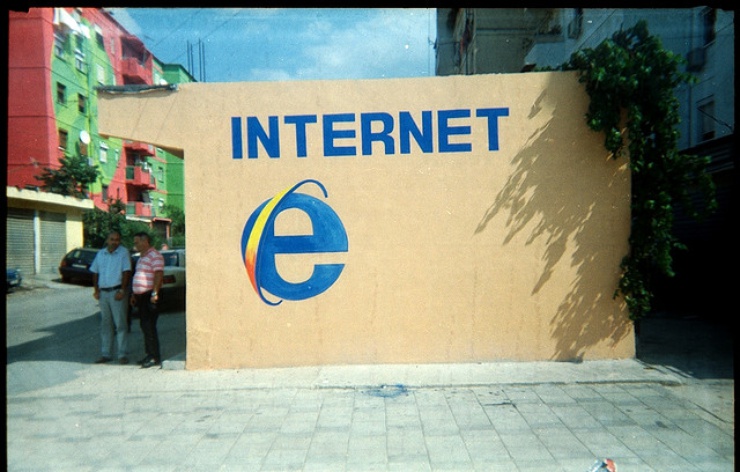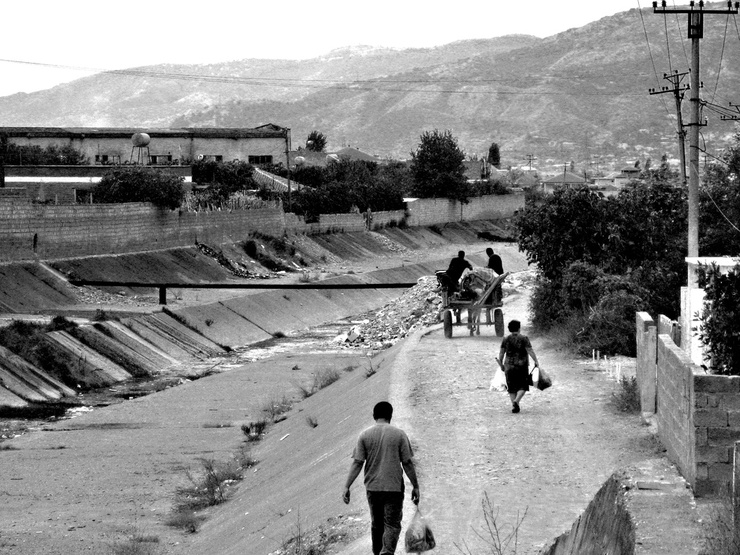
Internet or beans business: going 'home' to Albania from Greece
Published on
Translation by:
Marie JacksonGrowing numbers of Albanians like Ndricim and Vladimir are returning to their home country from crisis-stricken Greece. The brothers are just managing to get by running an internet cafe, but the new start has not been an easy one; Albania, too, has been badly hit by the economic crisis
Ndricim and Vladimir are sitting in the evening sun in front of a half-built internet cafe. They now rely solely on the one-storey building in the outskirts of the central Albanian city, Elbasan, for their livelihood. They have invested the bulk of their savings into the cafe, but it attracts only very few customers. Six months ago, the brothers returned to their home country from crisis-wracked Greece.
Growing numbers leaving Greece
In 1991, just before the fall of the Berlin wall, they, like many other thousands of Albanians, had made their way to the country. After ten days' marching, they crossed the mountainous border. On arrival, they quickly integrated into the resident Albanian community, the largest migrant group in Greece today. Vladimir is now 41 and Ndricim is 38. Sat on their plastic stools, they think back nostalgically about their difficult new start in Greece. 'At first, things were very bad for us,' they explain. 'We slept outside because no-one would rent to poor immigrants. But then things got better and we had a normal life. We had a flat, work, a car and the children went to school. We learned to live without fear. We thought that we had a chance.' Ndricim and Vladimir lived in Spata, an Athenian suburb in which you can hear the droning of aeroplanes passing overhead. Ndricim worked as a concrete worker during the building of Athens' airport. Likewise, Vladimir found work with a construction company and later worked in insurance.

According to the Albanian news channel News 24, 1, 200 Albanian emigrants travelled back to their home country from Greece this year alone. The crisis was felt gradually, the brothers say. First came reduced hours, then huge cuts to their salaries, until in the end, Vladimir could no longer afford to pay the rent for his Athens apartment. His wife began to work illegally, packaging mobile phones and pasta into cardboard boxes - for an hourly wage of just three euros. When Vladimir could no longer see a way out, he decided to go back home. 'My children were dead set against it; they grew up immersed in Greek culture and went to school in the country,' he says. 'When they travelled to Albania to see their grandparents, they travelled as holiday-makers, not to stay permanently.' Even today, his children are struggling to integrate into the Albanian culture. At school, in particular, there are many problems, because only Albanian is spoken, whilst Vladimir's children still speak to each other in Greek. On several occasions already, the children’s teacher has called on the parents to stop them speaking Greek in an Albanian school.
Doors not open ahead
Whilst the brothers continued to work in Greece, they began to build their own homes in Elbasan. To have their own home for their old age and for their children - that was the dream of many emigrants. Finally, they had a secure income, and they hoped that Albania's economy would also change for the better. But then their money ran out. Ndricim was only able to finish his first floor, whilst Vladmir only finished his basement. There are many repatriates, like the brothers, who now live in half-built homes.
'We left Greece with a mind to doing something here, but there's just no work'
The brothers’ first days in Albania were bitterly disappointing. The Albanian government, headed by prime minister Sali Berisha, placed high hopes on the returnees. It hoped that they would invest the money they earned abroad back into Albania. In fact, many emigrants had lost their faith in the Greek banking system and had, indeed, invested their money in Albania - around 510 million euros by the end of May 2012. Because of the weak economy, many now need this money just to survive. Meanwhile, better-qualified immigrants are swamping the Albanian job market and crowding out less qualified Albanians. Over the past year, Ndricim has only worked a total of two months. 'We've just lived off of our savings,' he says. He has been hired illegally by a construction company in Elbasan, earning only a fraction of what he was making in Greece.
Imminent recession
The most pressing problem for the Albanian economy is the dramatically high youth unemployment rate. At 13%, this rate is still lower than that of neighbouring Greece (21%). The crisis in Greece continues to effect Albania. Before, Greek companies would invest in the country's weak infrastructure. Today, building sites are sitting idle. Albania is being hit increasingly by power outages and the streets are in disrepair. Food and energy are getting more expensive every day. The beginning of the year also signalled the first decline in Albanian exports in two years, the majority of these being destined for the equally crisis-stricken Italy.

The brothers have worked hard to avoid falling into poverty. In addition to his internet cafe, Vladimir is now cultivating beans on a hectar of land in his hometown. But nothing guarantees that he will be able to sell these at the market. Ndricim would go back to Greece at a moment's notice. 'As soon as my employer calls me, I'll go straight back to Athens,' he says. 'There I can earn fifty to sixty euros per day, here I earn just fifteen. Really, it's pointless to stay.' This is except for the fact that he wouldn't put his children through another relocation, 'because you don't play with children's lives'. The sun has almost set and Vladimir opens another can of beer. In the morning, the brothers will continue working on their internet cafe. They have nothing else left.
The author of this article, Eckehard Pistrick, is a member of the Berlin-based 'network for reporting on Eastern Europe' n-ost
Image: main (cc) jiuck; in-text internet cafe in Tirana (cc) muchYorick; Elbasan (cc) santacroce/ all via flickr
Translated from Internet und Bohnen: Von Griechenland zurück in die Heimat Albanien



